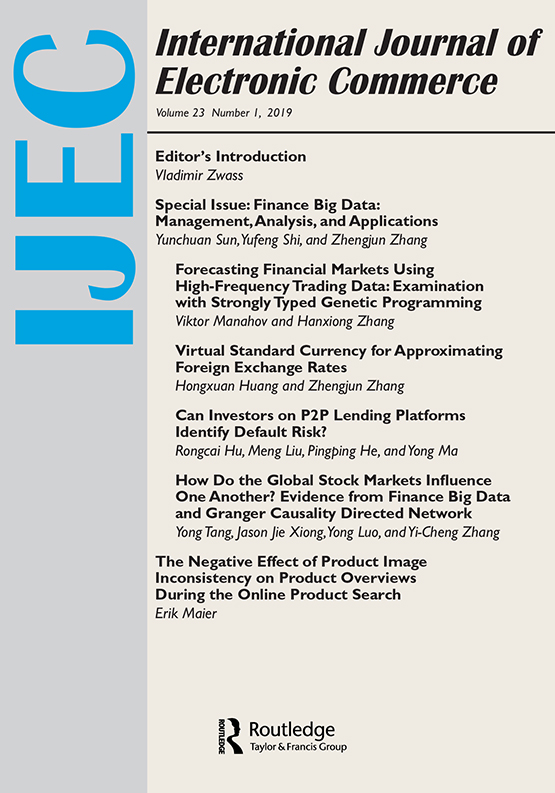More Personalized, More Useful? Reinvestigating Recommendation Mechanisms in E-Commerce
IF 3.8
3区 管理学
Q2 BUSINESS
International Journal of Electronic Commerce
Pub Date : 2022-01-02
DOI:10.1080/10864415.2021.2010006
引用次数: 8
Abstract
ABSTRACT To what extent should firms invest in personalized recommendation mechanisms, and are all personalized recommendations equally welcomed by online consumers? To answer these questions through the lens of resource matching theory, we investigate users’ perceptions of three types of personalized recommendations: one-to-all (nonpersonalized), one-to-many (partially personalized), and one-to-one (most personalized). Using both experimental and configurational analysis approaches, our study posits that online consumers differently experience each type of personalized recommendation and their resource matching sources (familiarity, complexity, external information) in various shopping contexts. Our study abductively formulates several theoretical propositions regarding the usefulness of each personalized recommendation. We show empirical evidence that the most personalized recommendation is not always perceived to be as useful as conventionally believed. In particular, highly personalized recommendation is found to be useful for recommending simple technology products for experienced customers. Ironically, a partially personalized recommendation, one-to-many, is perceived as the most useful mechanism for recommending complicated technology products. Based on our findings, we suggest that e-commerce vendors consider the three resource matching dimensions to avoid collecting more than enough customer data, thus enabling adequately personalized recommendation results on their online digital platforms.更个性化,更有用?电子商务中推荐机制的再研究
摘要企业应该在多大程度上投资于个性化推荐机制?所有个性化推荐都同样受到在线消费者的欢迎吗?为了通过资源匹配理论来回答这些问题,我们调查了用户对三种类型的个性化推荐的看法:一对所有(非个性化)、一对多(部分个性化)和一对一(最个性化)。使用实验和配置分析方法,我们的研究假设,在线消费者在不同的购物环境中对每种类型的个性化推荐及其资源匹配来源(熟悉度、复杂性、外部信息)的体验不同。我们的研究归纳了关于每个个性化推荐的有用性的几个理论命题。我们展示了经验证据,表明最个性化的推荐并不总是像传统认为的那样有用。特别是,高度个性化的推荐对于向有经验的客户推荐简单的技术产品是有用的。具有讽刺意味的是,一对多的部分个性化推荐被认为是推荐复杂技术产品的最有用机制。基于我们的研究结果,我们建议电子商务供应商考虑三个资源匹配维度,以避免收集过多的客户数据,从而在其在线数字平台上实现充分个性化的推荐结果。
本文章由计算机程序翻译,如有差异,请以英文原文为准。
求助全文
约1分钟内获得全文
求助全文
来源期刊

International Journal of Electronic Commerce
工程技术-计算机:软件工程
CiteScore
7.20
自引率
16.00%
发文量
18
审稿时长
>12 weeks
期刊介绍:
The International Journal of Electronic Commerce is the leading refereed quarterly devoted to advancing the understanding and practice of electronic commerce. It serves the needs of researchers as well as practitioners and executives involved in electronic commerce. The Journal aims to offer an integrated view of the field by presenting approaches of multiple disciplines.
Electronic commerce is the sharing of business information, maintaining business relationships, and conducting business transactions by digital means over telecommunications networks. The Journal accepts empirical and interpretive submissions that make a significant novel contribution to this field.
 求助内容:
求助内容: 应助结果提醒方式:
应助结果提醒方式:


